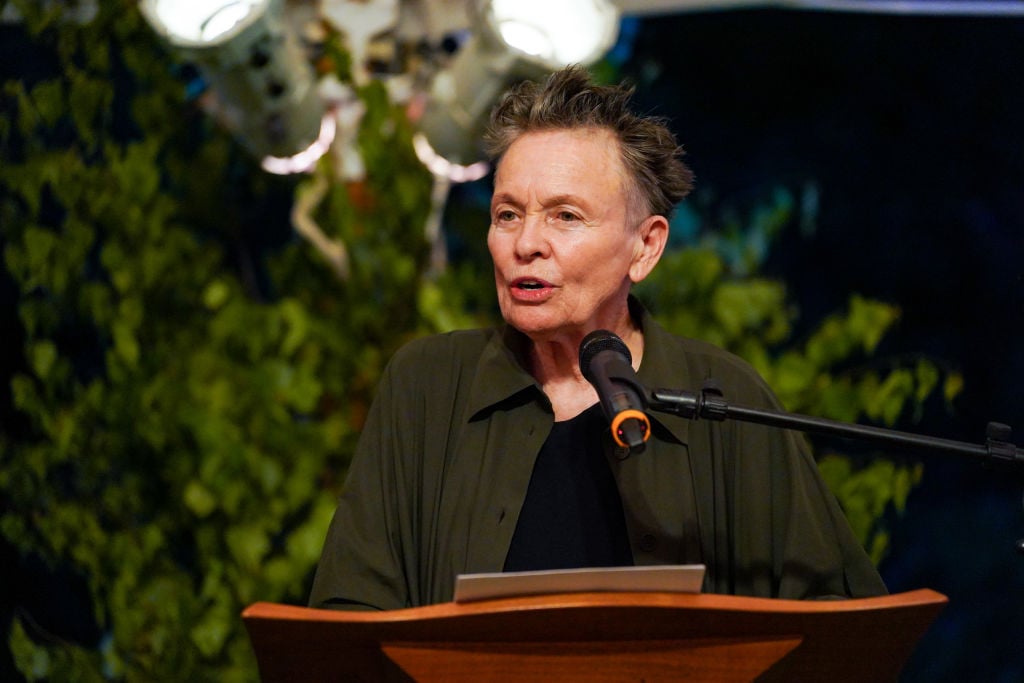
Laurie Anderson has withdrawn from a professorship at Germany’s Folkwang University of the Arts following an inquiry led by the institution into her pro-Palestine political stance. The U.S. artist was a signatory on an open “letter against apartheid” written by Palestinian artists in 2021 calling for the cessation of Israeli violence against Palestine.
Anderson was offered the Pina Bausch visiting professorship earlier this month, before university leadership knew of her support of the 2021 letter. Once made aware, they allegedly asked the artist whether her stance against Israel had changed.
“For me, the question is not whether my political views have changed. The real question is, why is this question even being asked?” Anderson said in a press release issued by Folkwang University. “Against this background, I am withdrawing from the project.”
Anderson was due to take up the one-year position in April, following Marina Abramović.
In the press release, representatives of the university said that they, along with colleagues at the Pina Bausch Foundation and the artist, did not make the decision “lightly” but in “the context of the current discourse about freedom of art and freedom of expression.” They added that “the university resolutely opposes all forms of anti-Semitism, misanthropy, and racism.”
Anderson’s withdrawal is just another recent example of ongoing friction between artists and art organizations and institutions, many of which are increasingly becoming sites of dissent amid a fresh wave of demonstrations against the war in Gaza.
On Friday, January 26, a group of women gathered outside of London’s Tate Modern to protest the reported sexual violence by Hamas against Israeli hostages by wearing bloodied pants reminiscent of those worn by 19-year-old Israeli Naama Levy, who was taken hostage by the militant group on October 7. The protest coincided with an event about the collective Guerrilla Girls and the Russian punk resistance group Pussy Riot, timed to the museum’s current exhibition, “Women in Revolt!: Art and Activism in the U.K., 1970–1990.”
The organizers of the demonstration said the event “showed the silence and complicity of the international feminist community in the face of the mass rape of women and girls by Hamas,” according to The Jewish Chronicle, which first reported the news.
The following day, Pace Gallery’s headquarters in New York City were closed to the public after the exterior of the space was spray-painted with pro-Palestine messages such as “free Gaza.” The act comes after the gallery posted a contentious video on Instagram on January 14 showcasing the work Signaling, a 2023 video by Israeli artist Michal Rovner, who is represented by the gallery. According to Pace’s description, the video is “a call for the safe return of the more than 100 Israeli hostages still missing.”
After receiving backlash in the comments claiming a lack of acknowledgement of more than 26,000 Palestinian deaths in the conflict, the post was edited to include “broader context of the ongoing conflict in Gaza and the horrific loss of life.”
Pace is not the first gallery to be tagged with phrases related to the conflict in Gaza. Lévy Gorvy Dayan gallery was plastered with posters protesting its owners’ views on the conflict more than once. Multiple galleries on the Lower East Side were also pasted with anti-Zionist posters earlier this month, calling for the dealers to address Israel’s airstrikes on Gaza.
“We are a gallery that consists of a community of artists and employees, many of whom are actively engaged in sociopolitical issues and attuned to global events,” Pace said in a statement after the gallery was closed for cleaning on Saturday. “With this diversity comes divergent viewpoints. In cases of disagreement, we remain committed to supporting meaningful civil discourse.”